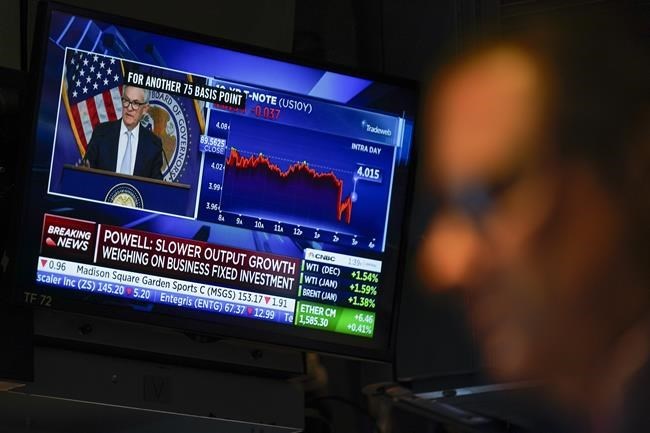NEW YORK ŌĆö Stocks slipped on Wall Street and Treasury yields again rose to multiyear highs a day after the Federal Reserve indicated that its fight against inflation is far from over. The S&P 500 fell 1.1% Thursday. The Nasdaq composite and the Dow also fell. Technology stocks were among the heaviest weights on the market. The yield on the two-year Treasury note, which tends to track expectations for future Fed moves, rose to its highest level since 2007. Higher Treasury yields have helped push mortgage rates sharply higher this year. The Bank of England made its biggest rate hike in three decades.
THIS IS A BREAKING NEWS UPDATE. APŌĆÖs earlier story follows below.
Stocks are down on Wall Street and Treasury yields are again bumping up against multiyear highs Thursday, a day after the Federal Reserve indicated that its fight against inflation is far from over.
The S&P 500 fell 0.6% as of 2:44 p.m. Eastern. The benchmark index was roughly split between gainers and losers. The Dow Jones Industrial Average slipped 42 points, or 0.1%, to 32,106. The tech-heavy Nasdaq fell 1.2%.
The yield on the 10-year Treasury rose to 4.12% from 4.09% late Wednesday. Bond yields are hovering around multiyear highs as the Fed raises interest rates. That has prompted and it continues putting pressure on stocks. The yield on the two-year Treasury, which tends to track market expectations of future Fed action, rose to 4.72% from 4.61%
The Fed on Wednesday and suggested that the pace of rate hikes may slow. The central bank also indicated that interest rates might need to ultimately go even higher than previously thought in order to tame the worst inflation in decades.
The central bank's latest three-quarters of a percentage point raise brings short-term interest rates to a range of 3.75% to 4%, its highest level in 15 years. Wall Street is evenly split on whether the central bank ultimately raises rates to a range of 5% to 5.25% or 5.25% to 5.50% next year.
Higher rates not only slow the economy by discouraging borrowing, they also make stocks look less appealing compared to lower-risk assets like bonds and CDs.
Stubbornly hot inflation has been prompting central banks around the world to also raise interest rates. On Thursday, the Bank of England announced its . The increase is the Bank of EnglandŌĆÖs eighth in a row and the biggest since 1992.
European and Asian markets closed mostly lower.
Technology and communication services stocks were among the biggest weights on the market. Apple fell 3.6% and Warner Bros. Discovery slid 6.7%.
Those losses kept gains in industrial, energy and other sectors in check. Boeing jumped 6.7% and Marathon Petroleum rose 3%.
Investors had been hoping for economic data signaling that the Fed might ease up on rate increases. The fear is that the Fed will go too far in slowing the economy and bring on a recession.
Hotter-than-expected data from the employment sector this week has so far signaled that the Fed has to remain aggressive. On Friday, Wall Street will get a broader monthly employment update from the U.S. government.
Wall Street has also been closely watching the latest company earnings reports. The reports have been mixed and many companies have warned that inflation will likely continue pressuring operations.
Booking Holdings rose 4.3% after reporting strong third-quarter financial results. Robinhood Markets climbed 10% after the investing app operator reported third-quarter earnings that topped Wall Street's forecasts. Chipmaker Qualcomm fell 6.5% after giving investors a weak profit and revenue forecast.
ŌĆöŌČ─ö
Joe McDonald and Matt Ott contributed to this report.
Damian J. Troise And Alex Veiga, The Associated Press


